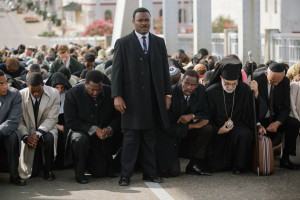Selma
 -from contributing editor, Andy Ray
-from contributing editor, Andy Ray
Ava DuVernay’s Selma is a monumental achievement in filmmaking with one very glaring historical inaccuracy. Much as Steven Spielberg did with Lincoln, DuVernay wisely shows us just one small but important snapshot in the life of the film’s hero, Dr. Martin Luther King. The 1965 Alabama march (Selma to Montgomery) was perhaps the peak event of the Civil Rights Movement, directly resulting in passage of the Voting Rights Act of 1965. Organized by Dr. King, local police violence against non-violent African-American citizens was broadcast all over the world, and was, in large part, responsible for changing America’s attitude toward the racist injustices of the day.
British actor David Oyelowo plays Dr. King not so much as an impersonation, but as a character who embodies King’s spirit. Oyelowo’s King intones the exact cadences of Dr. King’s preaching. While we know we’re not actually watching King himself, it certainly sounds like it. Ironically, DuVernay was not allowed to use any of King’s actual verbiage, making Oyelowo’s acting achievement all the more astounding. He’s not King, and he’s not even speaking King’s own words, but again, it sure sounds like it. Why he wasn’t nominated for a Best Actor Oscar is beyond me.
My primary issue with Selma is its portrayal of President Lyndon Johnson as a roadblock to passage of the Voting Rights Act – legislation for which King fought aggressively. DuVernay depicts King and Johnson practically coming to fisticuffs over this bill, with Johnson enraged by King’s bullying. In reality, Johnson and King may not have always seen eye-to-eye, but Johnson considered the Voting Rights Act one of the two greatest legislative achievements of his presidency, and he deemed King an ally in the fight against racism in the South. Perhaps DuVernay felt the storyline required a certain amount of tension, but the tension here is misplaced. Tension between King and the local sheriff? Fine. Tension between King and the Southern local media? To be expected. But King vs. Johnson? Not only is it historically inaccurate, but it tarnishes Johnson’s legacy to an entire generation who might be unfamiliar with him. Now, I’m no huge fan of Lyndon Johnson’s. But criticism must be applied when and where it is applies. Tom Wilkinson does as good a job as anyone I’ve seen play Johnson on screen, but the role itself is deeply flawed because it is simply wrong.
And that’s unfortunate. This egregious deception tarnishes an otherwise excellent film. Selma legitimately brings us to a specific time and place. When the peaceful marchers cross the bridge to the courthouse, they come face to face with an all-white and heavily-armed police force. I felt as though I were actually there – not simply watching some PBS documentary, but present and accounted for. It’s a powerful scene, and to think that it occurred in my lifetime is heartbreaking.
On a more minor note, I was also disappointed that the titles at the end of the film (the “what happened to these characters later in life” titles) left out a great portion of former Alabama Governor George Wallace’s story. DuVernay correctly tells us that in 1972, Wallace was shot and paralyzed while campaigning for United States President. What she leaves out is that Wallace renounced segregation about a year before his death in 1998. What an important piece of information! I would think the fact that the greatest political obstacle to racial harmony in the South publicly proclaimed a late-life conversion of thought is not only substantial, but also an uplifting footnote to the legacy of Dr. King. Almost 30 years after his assassination, King’s greatest political enemy embraced his teaching! That’s almost as incredible as the Roman Empire’s embrace of Christianity. And it was omitted.
Again, Selma is mostly a great and powerful film. The disappointing legacy of the Civil Rights Movement is that African-Americans still believe, in large part, that law enforcement is working against them. Unfortunately, this belief is justified, as recent events have manifested. If we are lucky, Selma will act as a call to action for 21st-Century African-Americans to advocate for equal treatment by authorities. I hope Selma also acts as an example of how non-violent dissent is, in fact, the only dissent which has ever changed public policy and beliefs. A very important scene shows King and fellow Civil Rights leader Malcolm X disagreeing over the most effective method of achieving their goal. Non-violence must become the modus operandi for today’s racial resistance, lest those opposed to change paint the entire movement incorrectly.
So do I recommend Selma? Yes, but with the caveat that this is a motion picture, and that, while it feels realistic, everything you see is not factual. I would not recommend using this film as a teaching tool for those too young to understand this reality.